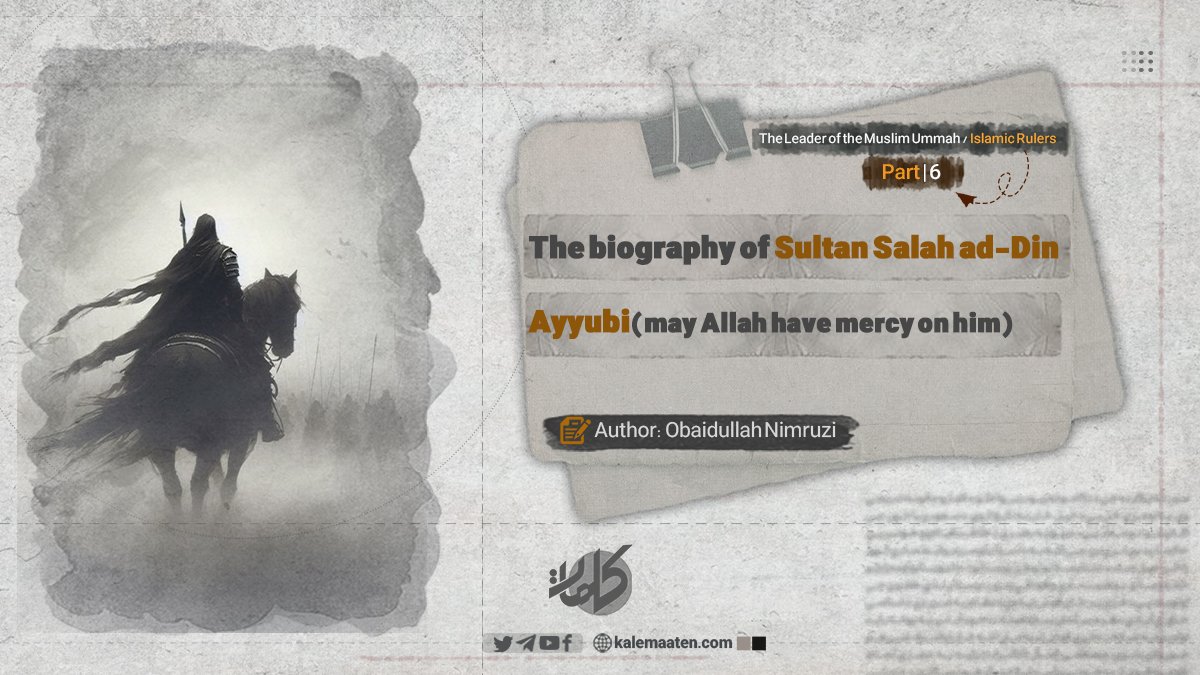
Author: Obaidullah Nimruzi
The Biography of Sultan Salah al-Din Ayyubi ‘May Allah Have Mercy on Him’ (Part 6)
In the first part of this research, we mentioned that the beginning of this research was written as an introduction to prepare the mind for a better understanding of the biography of Sultan Salah al-Din Ayyubi, may Allah have mercy on him. In this section, we would like to explore the personality, qualities, and political actions of Sultan Salah al-Din Ayyubi.
Sultan Salah al-Din Ayyubi (may Allah have mercy on him)
Sultan Saladin’s father’s name was Ayyub; therefore, he and his family are called Ayyubi. It should not be inferred from this title that they are from the lineage of Abu Ayyub Al-Ansari, because the Sultan and his family were of Kurdish descent, still found in the countries of Iraq, Syria, Turkey, and Iran. His parents and family were residents of a village called “Devin” in East Azerbaijan Province (Iran). They belonged to the “Rawadiyeh” tribe, which is a branch of the Kurdish Hasina tribe. It is established that his grandfather, Shadi, along with his two sons, Ayyub Najm al-Din and Shirkuh Asad al-Din, were transferred to Baghdad and settled in Tikrit, where Shadi passed away. Shortly thereafter, both of his sons were employed in the service of Mujahid al-Din Behrouz, who was the commander of the region on behalf of Sultan Masoud ibn Ghiyas al-Din, Muhammad Ibn Malik Shah Seljuk. Subsequently, Najm al-Din Ayyub joined the service of Imad al-Din Zangi, one of the guards at the Baalbek fortress.
The existence of Salah al-Din Ayyubi is a miracle among the miracles of the Holy Prophet, peace and blessings be upon him, and serves as clear proof of the sincerity and eternity of Islam. Ayyubi was born into a modest yet noble family and grew up in a militaristic environment.
Before conquering Egypt and engaging in the struggle against the Crusaders, no one could have imagined that this young boy would become the conqueror of Al-Quds and a protector of Islam in the near future—a role that would bring him joy envied by nobles and the righteous. The significant achievements of this young man would surely please the blessed soul of the Prophet of Islam, peace and blessings be upon him. Lynn Poole wrote: “Instead of Salah al-Din Ayyubi exhibiting signs of the greatness to come, which would serve as a foundation for stability, he was a reason that preserved noble qualities from all weaknesses and corruption.” Nonetheless, when Allah Almighty intended for Muslims to benefit from his existence, He provided him with means from the unseen.
Salah al-Din was sent to Egypt by Nur al-Din Zangi. Qazi Baha al-Din Ibn Shaddad, a trusted and special confidant of the Sultan, wrote: “Sultan Ayyubi himself told me that he accepted this mission very reluctantly and came to Egypt with no inclination or desire to do so at all.” This situation is echoed in the Qur’an: «عسى أن تكرهوا شيئاً وهو خير لكم» (“Perhaps you hate something, and it is good for you”). After arriving in Egypt, Salah al-Din’s path became entirely clear, and he became the ruler of the country there. His life took a new direction, and he realized that Allah intended for him to undertake an important task which was incompatible with a life of luxury and leisure.
Qazi Baha al-Din wrote that after assuming control of the government in Egypt, worldly luxury seemed useless to him. Gratitude surged in his heart, leading him to renounce wine and all revelries, adopting an ascetic and vigorous lifestyle. This way of life contributed to significant progress and development.
Lynn Poole noted: “Now Salah ad-Din established strict rules for himself, pious as he was from the beginning; but during this period, he intensified his asceticism, renouncing all pleasures and luxuries. He adhered strictly to his thoughts, presented himself as a role model for his companions, and worked tirelessly to establish an Islamic government capable of combating the infidels. As he once stated, ‘When Almighty Allah granted me Egypt, I understood that He also intended to grant me Palestine.’ From that point until the end of his life, Salah Ad-Din’s goal was to support Islam, and he was resolutely determined to fight the infidels.”
Continues…


